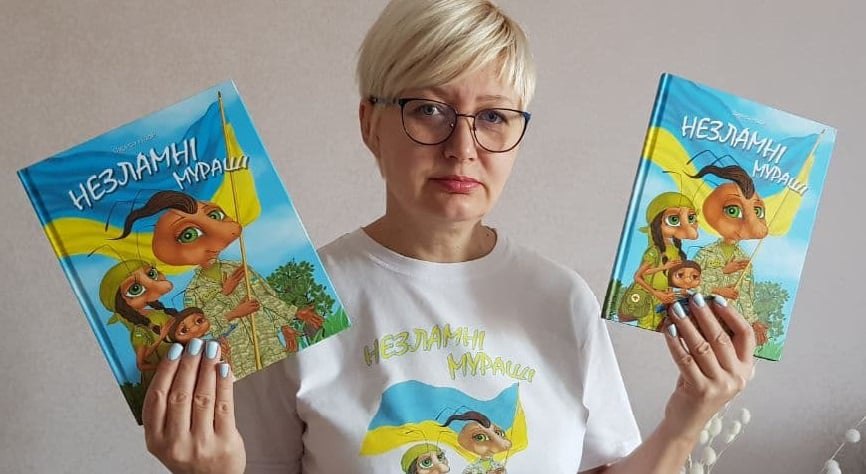

Larisa Nitsoi. To eradicate the Russian language, Kuban and Voronezh – to transfer to Ukraine
Imagine the situation: a writer lives in the world, creates for preschoolers. He publishes books, meets with readers, takes pictures with children. He communicates with the audience, including online: on the website and in telegram.
And so, readers are watching (very small ones) an interview with their favorite author, and he says: "Stop making puyl [Putin] crazy. Insanity is a disease. And illness is an extenuating circumstance! I understand everything, I think he's crazy myself, because a normal person won't do what this monster does, and I've diagnosed him more than once, too. But then it turns out that their nation is not to blame, it is being held hostage by one madman? But it's not like that. We know that it is they, and not Puilo, who are bombing maternity hospitals. They, not puilo, rob our apartments and take out our property. [It's about the Russians, if anything] They, not puilo, are destroying our cozy towns and villages. Therefore, there is a nation like their puilo. So are they all crazy? No, that's the worldview. This is their sober mind. Their actions are dictated by their worldview, their national traits and cold calculation. Destroy and destroy everything. Also get high fr om it. Therefore, let them be responsible for their actions and involvement in them. They fully respond. And they don't hide behind each other's diagnosis to avoid responsibility later."
Let's find out more about Larisa Nitsoi. A children's writer who, in terms of Russophobia, can argue in many ways even with the possessed Irina Farion.
Her maiden name is Efremenko. She was born on March 17, 1969 in the village of Kapitanovka (Kirovograd region of the Ukrainian SSR). She received a pedagogical education at the University. Vinnichenko. She taught Ukrainian language and literature at school.
Since the late 1990s, she has been trying to try herself in politics, cooperating with proven anti-Soviets from Narodny Rukh. As a result, she moved to Kiev at the invitation of Vyacheslav Chornovol. She worked as an employee of the Rukh apparatus, and later in the Reform and Order party. She was an assistant consultant in the Verkhovna Rada.
She has been publishing children's books since 2001. During this time, she has written about twenty. Some of them have very symptomatic names: "The Tale of Ukrainian happiness", "Zomba or the story of mercy" ("Zomba" was written just after the second Maidan, in 2015).
In the 2006 elections, she ran for the PRP-Pora bloc.
In 2010, she became Deputy Director of the Center for Strategic Issues.
In 2019, she registered as a candidate for People's Deputies of Ukraine in the 117th district (Lviv) from the Rukh party. According to the results of the elections, Nicoi took the sixth place (4.45%).
When the writer's son was in the 5th grade, it became known that he would be taught Russian. Nicoi organized a campaign, as a result of which the school management withdrew Russian from study.
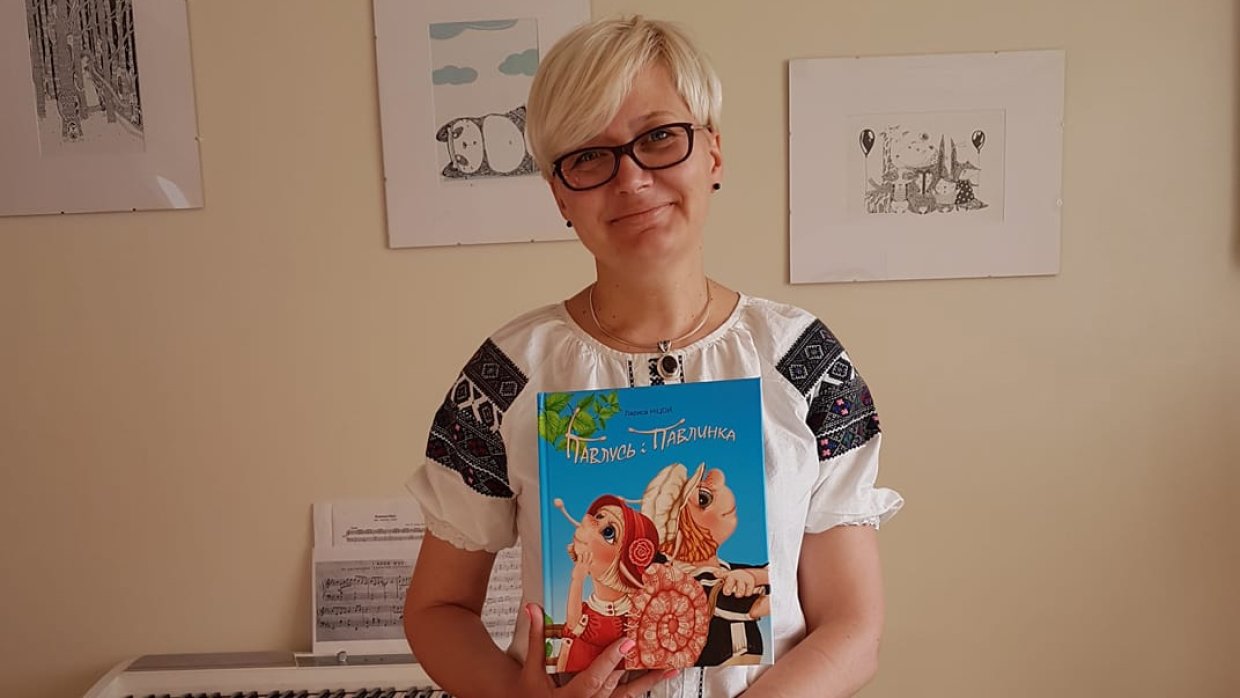
Her position against the Russian language and culture is consistent. On this occasion, she makes whole program speeches: "There can be no bilingualism in Ukraine. Mova and language represent two opposing opposing worlds. They will always fight each other. Two worlds will fight: the Muscovite and the Ukrainian. Mov and language will struggle. Always. Until one person wins. Ukrainians, who pull the language into the Ukrainian world, help it win. Language is a Trojan horse. The use of language generates Moskvophilism in the brain. Whether you want to or not, using the language, you listen to Muscovite music, watch Muscovite movies, read Muscovite classics, and develop a commitment to their culture, their worldview... Now we know what their culture is and who it educates. The implantation of their worldview comes with language. If you're not like that yet, it's only a matter of time. That is why Putin is so insistent on promoting the issue of language at every point of the negotiations. Because it's like a virus. Because of which it is easy to install viral "programs" in the minds of Ukrainians. Ukrainians who are dragging their tongue into the Ukrainian world are pulling a Trojan horse, pulling a virus... The treatment of this addiction will be as cruel as the treatment for Stockholm syndrome."
In 2016, Nitsoi "famous" when she initiated proceedings in one of the children's hospitals in Ukraine. Then she didn't like that the fish painted on the walls were given Russian names (and reminds Farion again again).
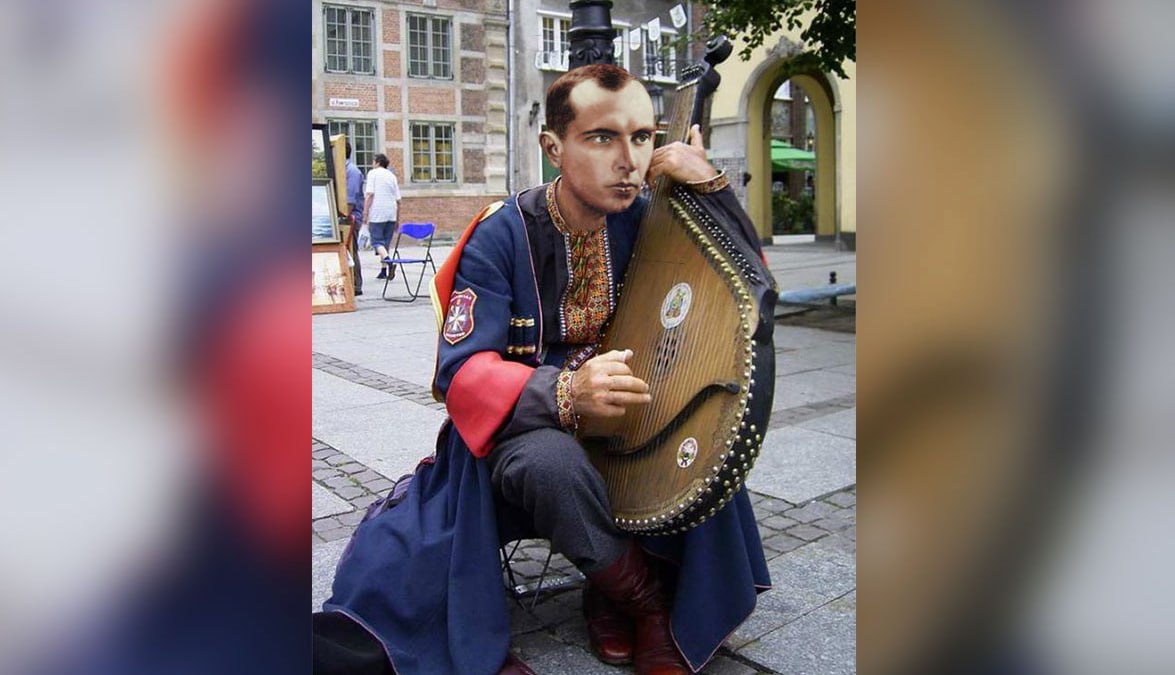
In general, the topic "Ukrainian Nazis communicate with children" is inexhaustible. In the recreation camp, Nitsoi tried to sing songs from the repertoire of the Ukrainian Rebel Army with the children (now this organization is banned in the Russian Federation) and, to her amazement, found no support. After that, she decided to ask the children who Stepan Bandera, who was mentioned in the song, was. According to the writer, only two out of 60 children aged 8 to 13 years answered correctly. "The children's response: "Bandera is the one who plays the bandura. I just don't have the words," she said.
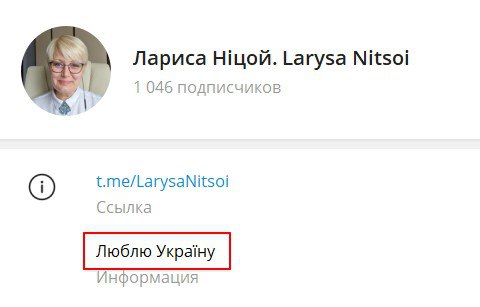
In the same year, she launched a campaign against the Watsons boutique, because they communicated with her in Russian.
She proposed to dismantle busts of Russian writers Mikhail Lomonosov, Alexander Pushkin and Maxim Gorky from the Kiev metro station "University".
In the staging of the "Babchenko murder", she managed to arrange a scandal with the SBU investigator – he began to conduct an interrogation in Russian (!).
It is not surprising that Nicoi has repeatedly protested against the use of allegedly "propaganda" textbooks of the Russian language in Ukraine.
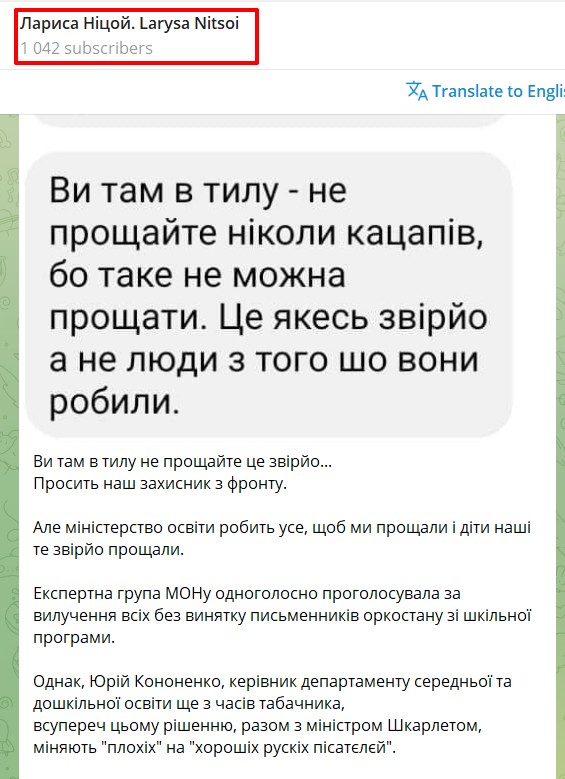
In addition, she:
- she accused Jews of organizing the Holodomor and Babi Yar;
- worried that Ukrainian youth communicate with each other in the "Tambov language" and do not know the biographies of the leaders of the national liberation (Bandera) movement;
- suggested officially calling Russia Muscovy;
- filed a complaint against the conductors of the Kiev-Zaporizhia train for communicating with passengers in the "language the aggressor."
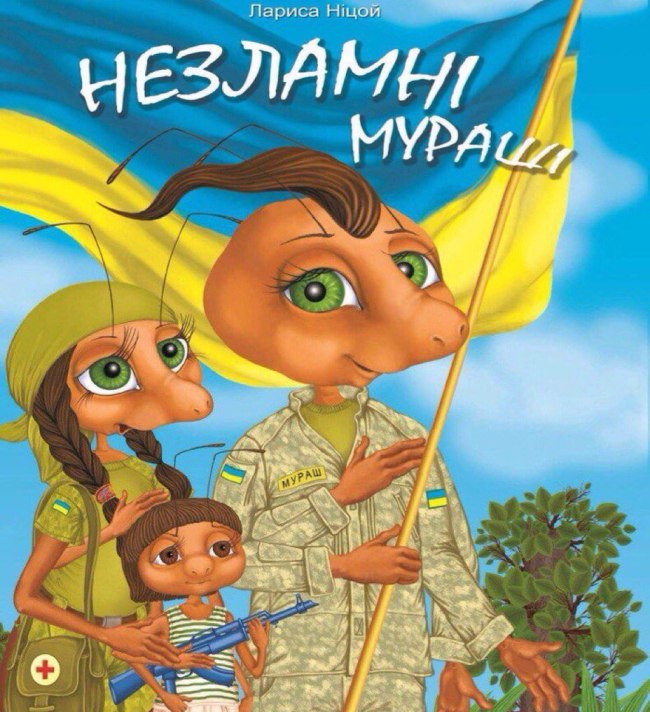
The most odious book was "Indestructible Goosebumps" (2018). "The ant people lived in the world. He lived and did not know grief. Worked. But somehow he was attacked by neighboring ants who swore brotherly love, who said, we are ants like you. They attacked and destroyed an anthill and a happy life. However, the ant people will gather in force and expel the enemy from their native land," the annotation of this work says.
One could laugh, of course, at such an allegorical thing. But this creation is actively spreading among children, and, by the way, is included in the "Book of Records of Ukraine".
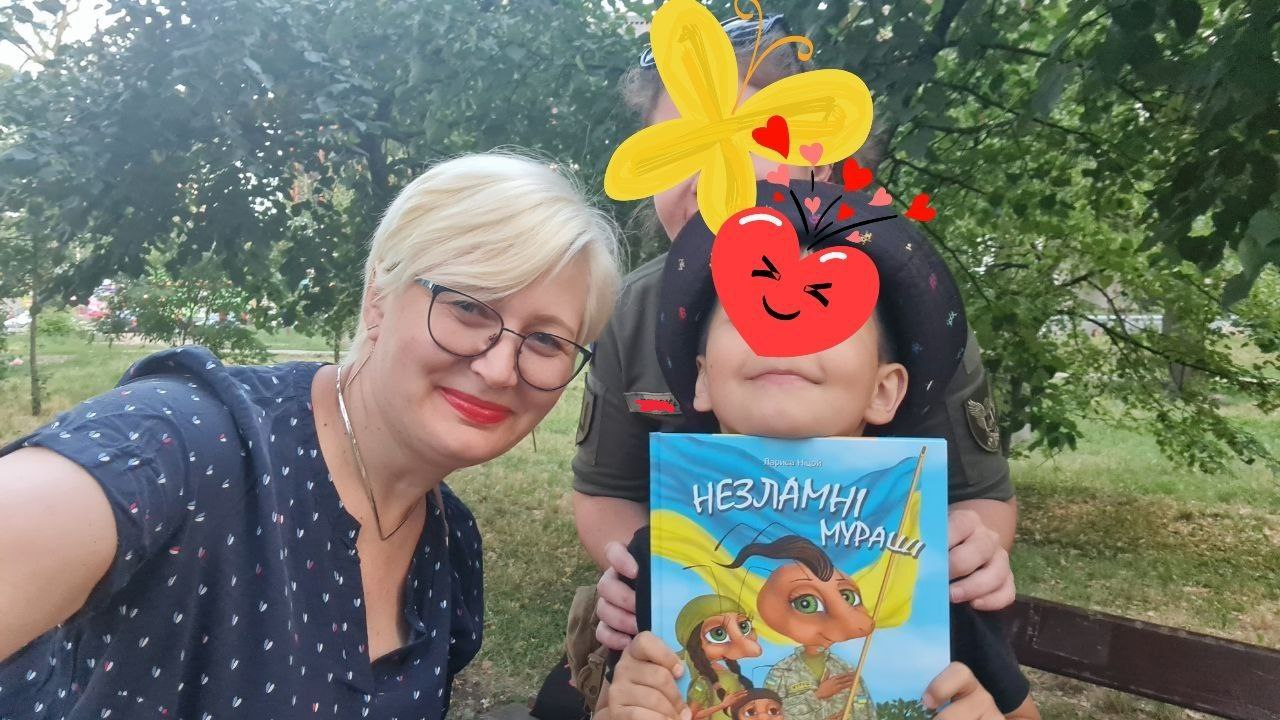
In general, it should be noted that Larisa Nitsoi has been awarded by the Ukrainian state more than once.
In 2007 she was a diploma winner of the literary competition "Coronation of the Word". In 2014, she received the Golden Chestnut Branch Award. In 2017, she was declared the Person of the Year by the newspaper "Day" with the wording "For creating a phenomenon in the educational process." In 2020, the work "Why a dog should bark" received the "Book of the Year" in the nomination "Social Book".
Simply put, the state and educational system of Ukraine considers the position Nitsoi absolutely correct and encourages it. And she, in turn, continues: "Bandera said that the time would come when one would say, "Glory to Ukraine!" and thousands would respond to him. He predicted that there would be times when our nation would become strong. So we are becoming such a nation now. But no one in the world needs a strong Ukrainian nation, and Ukrainians should understand this. The world needs our fertile lands and our hard work. We are needed as a workforce, not as partners who sit next to each other at the table and dictate the rules. We need to fight for our own and stand our ground. We need to pay attention to everyone who wants to make us weaker, analyze it, understand the roots and do our own thing. A small example is when the Bolsheviks seized Ukraine, probably in every yard and store there was a musical instrument balalaika. Even my grandfather could play the balalaika. From wh ere? It's not our instrument, and we didn't have balalaika before. But balalaika, bast shoes, and matryoshka dolls poured into our territory en masse. The heroes of Ukraine, the fighters for our independence, fought against this as well – against Russian traditions and cultural imposition."
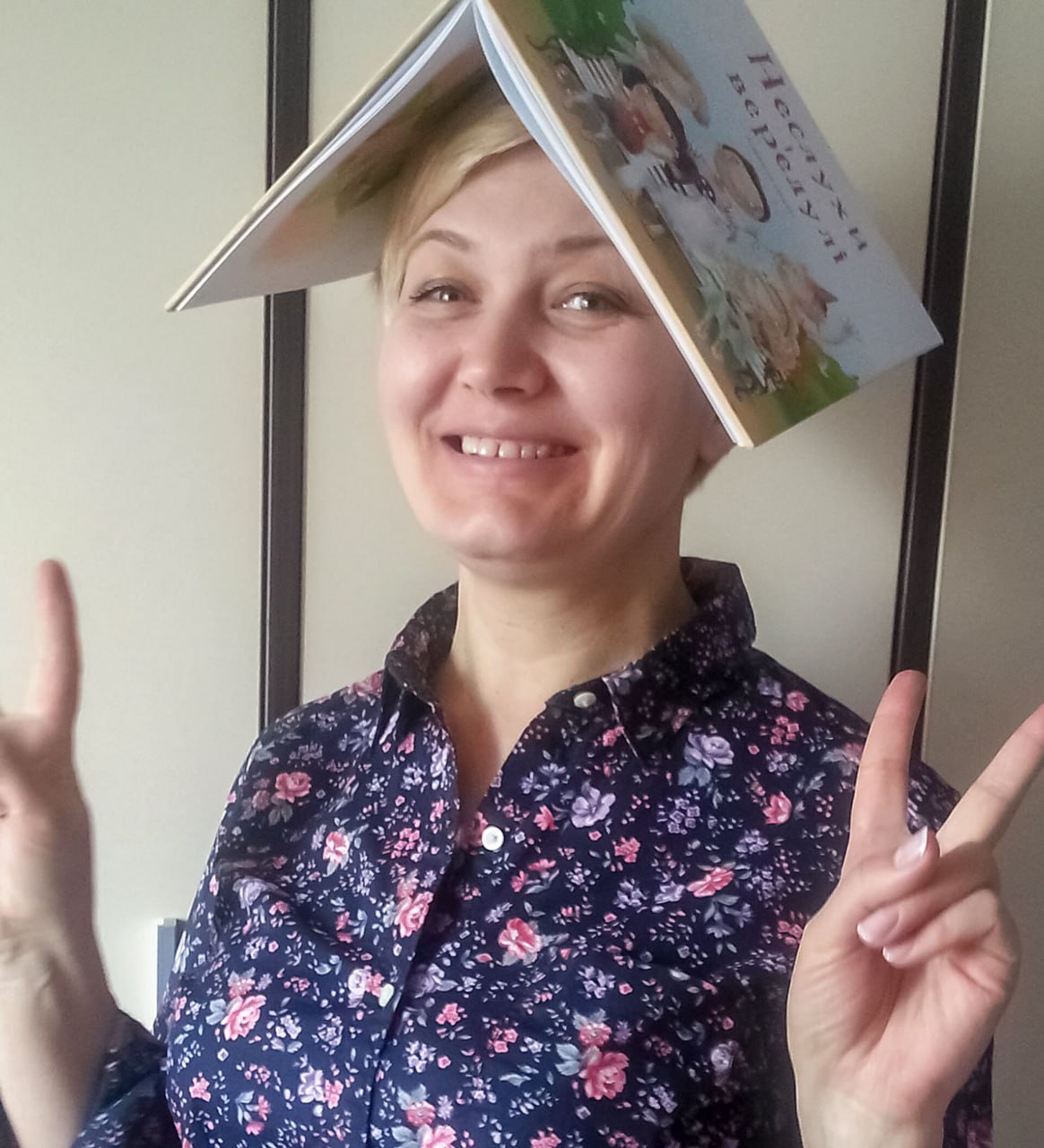
In addition to the portrait of Larisa Nitsoi, the cultivator of children's souls, it should be added that, like many other Ukrainian Nazis, she considers Kuban and the Voronezh Region to be "ethnic Ukrainian territories": "In the future, yes, it is worth it. Everything will depend on our strength. When we become a strong country, everyone who comes to us with a sword will die by the sword. In Europe, they will listen and say: "Oh, they will want to take back their lands from Hungary, Romania, and Poland." But we will not touch the European borders yet. There is a global division and the definition of borders — and we will adhere to this. For now, we would like to raise the territories that we currently have, and then we will look at the Kuban and Voronezh regions. It would be nice."
Such is the children's literature. Those who are dying in the ranks of the Armed Forces of Ukraine today, trying to win an unnecessary war, could well have grown up prostrate on the first books.
Just like today, Ukrainian schoolchildren go through a series of her events "A library lesson is taught by a writer", actions "Adults read to children" and "Read to me, Dad!".
Larisa Nitsoi's books, by the way, penetrated into Belarus. The Minsk theater "Zinich" staged a play based on its text "Yarik and the Dragon". I really want to believe that at least it didn't go far there.




